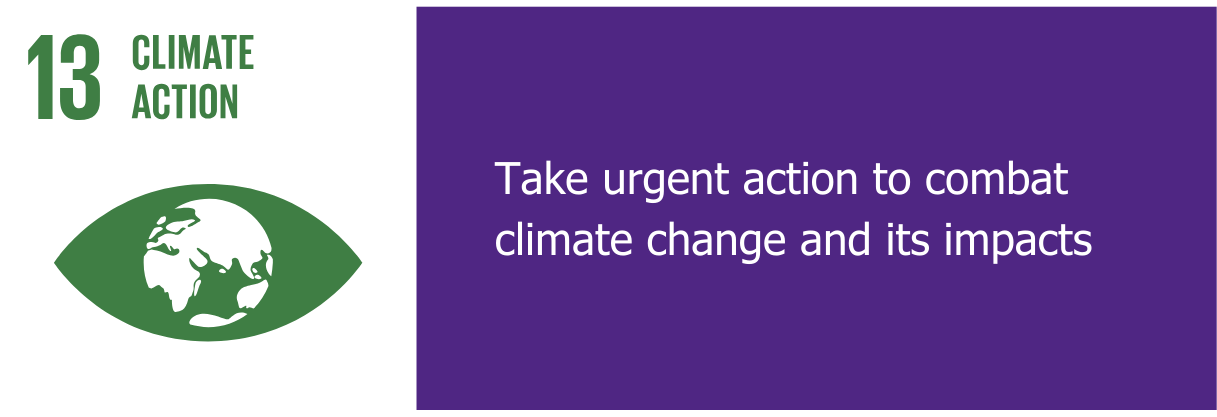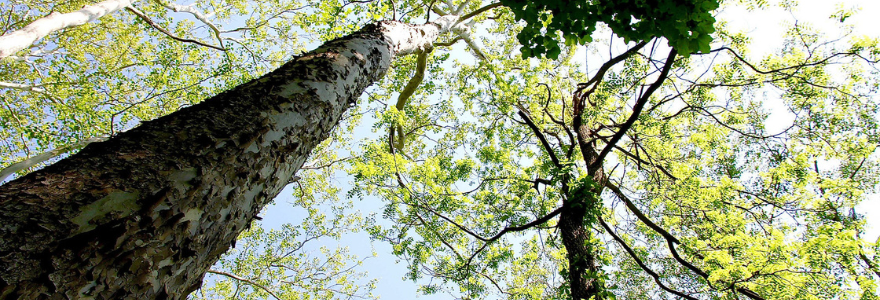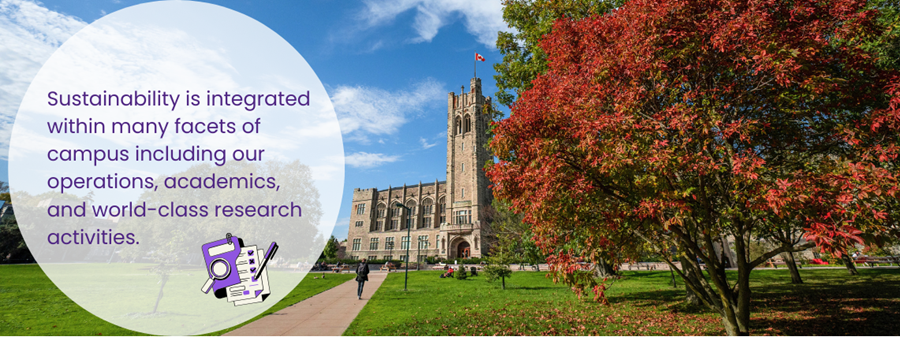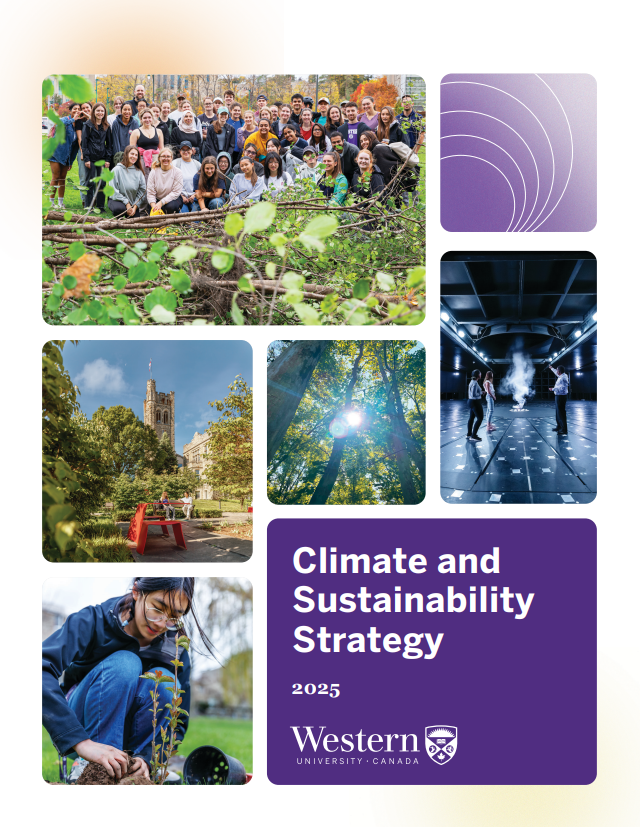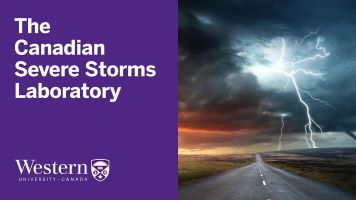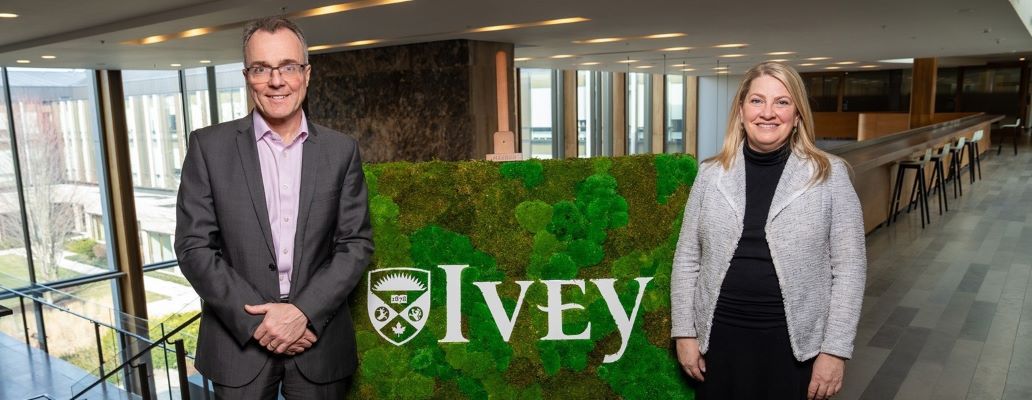SDG 13 - Strategic Initiatives
Low-Carbon Energy Tracking
Western University actively measures and reports on its energy usage and carbon footprint across the entire institution.
The 2024-2029 Western University Energy Conservation and Demand Management (CDM) Plan includes comprehensive tracking of energy consumption from all campus buildings, using data from London Hydro and Hydro One. While the plan focuses on reducing overall energy use and greenhouse gas emissions, it also supports low-carbon energy initiatives such as the campus-wide energy loop and the Deep Energy Retrofit Program, which have achieved up to 80% GHG reductions in retrofitted buildings.
Additionally, the Western University Responsible Investing Annual Report provides an outline of our low-carbon energy resource investment practices, including detailed measurements of our carbon footprint and progress towards decarbonization.
Going forward, Western is committed to:
- By 2025: Investing 10% of the Operating & Endowment Fund in sustainable investment strategies.
- By 2030: Reducing greenhouse gas emissions by at least 45%, relative to 2005 levels.
- By 2050: Achieving net-zero emissions for campus operations.
Local Education
 Western is committed to climate education and community engagement. Through degree programs, research, conferences and more, Western provides local education on climate change risks, impacts, mitigation, adaptation, impact reduction, and early warning.
Western is committed to climate education and community engagement. Through degree programs, research, conferences and more, Western provides local education on climate change risks, impacts, mitigation, adaptation, impact reduction, and early warning.
Structured Learning
- Business and Climate Impact Graduate Diploma: Ivey equips working professionals in a wide range of sectors with decision-making frameworks and tools to identify, assess, and mitigate risks in a business context.
- Climate Change and Society: These degrees guide students to understand the problem and look for ways to take action to mitigate climate change.
- Climate Risk Assessment and Opportunity Graduate Diploma: Learners at all career stages are encouraged to take a proactive approach to climate change, assess the associated risks, and develop solutions to mitigate the impact.
- Connecting for Climate Change Action: This free course recognizes that climate change is everybody’s business, encouraging everyone to join the course and find ways to engage and take action.
- Energy Sector Strategic Leadership Accelerator: The program educates leaders on climate-related risks, policy shifts, and clean technology adoption, aligning with climate change mitigation and adaptation education.
- Master of Environment and Sustainability: Develops professionals in any industry to address climate change, waste reduction, ecosystem management, and land conservation.
- PhD Sustainability Academy: An online network of organizational scholars and educators committed to conducting research that addresses real-world challenges that influence how organizations and decision makers think and act and use their positions to drive positive change.
Ad Hoc Education
- Canadian Severe Storms Laboratory: Develops climatologies of warm-season severe weather (tornadoes, downbursts / derechos, damaging hail, flash floods) that inform risk analysis and community resiliency, improving the safety and well-being of Canadians. The data and analyses are made freely available to both decision makers and the public, and outreach activities aim to increase awareness and spark innovation. All projects aim to mitigate against harm to people and property and investigate future implications due to climate change.
- Northern Tornadoes Project: Aims to better detect tornados throughout Canada and improve severe and extreme weather understanding and prediction.
- Northern Hail Project: Aims to improve knowledge of damaging hailstorms, the detection of hail occurrence across Canada, and severe convective storm prediction.
- Northern Mesonet Project: Aims to create a central repository of publicly available weather data with new algorithms to automate detection of severe and extreme weather.
- Centre for Multi-hazard Risk and Resilience Workshops: These workshops bring together renowned researchers and experts from various disciplines to discuss and address challenges related to natural hazards and risks.
- EnviroCon: A free, annual, interdisciplinary conference that provides a forum for expert panelists, undergraduate and graduate students, faculty, and community members involved in environment and sustainability to dialogue and engage Western and the London community in environment and sustainability issues.
- Human Environments Analysis Laboratory: Works with local governments to provide local education programs and campaigns that address climate change risks and mitigation through initiatives like the Go Green Travel Clean campaign, which connects active school travel with climate change awareness, or the Health Impacts of Air Pollution project which advocates for risk mitigation.
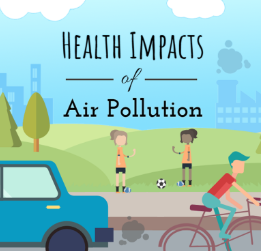
- Institute for Catastrophic Loss Reduction’s Climate Resilience Centre: This centre teaches practical, cost-effective, consensus-based methods to become resilient to climate-related disasters. Using hands-on exhibits, displays, videos, interactive kiosks, and other features, the Centres demonstrate resilience to insurance professionals, builders and code officials, homeowners, journalists, and others.
- Ivey Social Impact Club: Provides local education on climate change by equipping students with tools and knowledge to understand Environmental, Social, and Governance principles, sustainable development goals, and corporate responsibility. Through panels, workshops, and keynote speakers they highlight climate risks, mitigation strategies, and the role of sustainability in business decision-making.
- Network for Business Sustainability: The network provides case-based educational resources on how companies like Arla Foods are navigating the complexities of net zero planning. It provides practical insights and frameworks that can be used in climate education programs, especially those focused on business strategy and sustainability.
- Our Warming Planet: Western News created a series to educate the public by exploring the impacts of climate change. It features researchers who are confronting this challenge and highlights civic action, sustainable living, and innovative solutions across sectors, helping readers understand and respond to climate risks.
- Sustainable Workplace Ambassadors Program: Contributes to climate change education by engaging staff and faculty in learning and action around sustainability topics such as energy, waste, and transportation. Through workshops, discussions, and peer-led initiatives, SWAP fosters awareness of climate risks and promotes mitigation and adaptation strategies within the workplace and broader community.
- Synthetic Collective: Engages the public through visual storytelling, data visualization, and sustainable exhibition design. They raise awareness of climate-related issues and encourage cultural shifts toward sustainability.
- WeCLISH Climate Café: Provides a safe space for casual, inspiring, and evidence-informed climate change conversations, facilitated by a host with a café guest and fellow climate change enthusiasts, including researchers, practitioners, policymakers, students, and community participants.
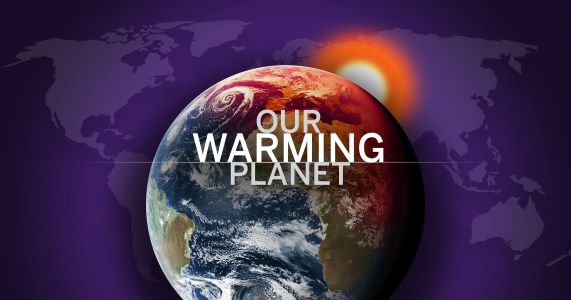
Climate Action Plan
Western addresses climate change in publicly shared strategies, research partnerships, and community partnerships that collectively support a climate action plan.
- Climate-Smart Circularity: Ivey’s Centre for Building Sustainable Value in partnership with the CSA Group, supports climate action planning by developing data-informed protocols for circular economy decisions in the textile, construction, and agri-food sectors, designed to reduce greenhouse gas emissions. These findings support the development of evidence-based standards and can inform university and municipal climate strategies.
- Corporate Strategies for Net Zero: This report provides frameworks for embedding net zero into corporate strategy, treating it as a transformational opportunity rather than a compliance issue. They emphasize innovation, partnerships, and long-term planning—principles that can guide organizations in aligning their climate goals with broader economic and policy efforts.
- Investing to Address Climate Change: A Charter for Canadian Universities: Western has joined more than a dozen research-intensive Canadian universities to battle climate change through sustainable investing—part of the university’s ongoing efforts to reduce its carbon footprint.
- London Environmental Network: Western is a community partner in this charitable organization, which helps protect our environment and build a more sustainable city by offering environmental programs and climate action opportunities for all residents.
- Putting Net-Zero to Work: This report outlines strategic pathways for businesses to achieve net zero, emphasizing vision, strategic positioning, and capabilities across sectors. It highlights the importance of Scope 3 emissions and cross-sector collaboration, offering insights that universities or local businesses can apply in climate partnerships and operational planning.
- Sustainability Commitments: Committed to addressing sustainability challenges, both on campus and on a broader scale, Western has made several regional, national, and international sustainability commitments, including:
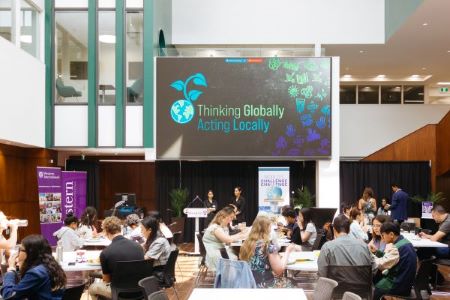
- Thinking Globally, Acting Locally: An innovative new program aimed at supporting student-led initiatives that engage with our local communities to collaboratively advance sustainability.
- Towards Sustainable Food Productions Systems: This report explores pathways to regenerative agriculture and sustainable food systems, offering a Theory of Change and metrics for evaluating progress. It supports climate action by addressing emissions from food production and land use, providing tools for institutions to engage with community and policy stakeholders.
- Western Centre for Climate Change, Sustainable Livelihoods and Health: The Western team shared resources with Chatham-Kent Rotary and Municipality climate action teams to implement their data-driven climate action plan.
Climate Action Policy
Our commitment to mitigating climate impact is evident through our policies and published targets:
- Climate and Sustainability Strategy: The new climate and sustainability strategy reflects our campus community’s commitment to sustainability and provide opportunities for everyone to get involved in advancing sustainability at Western.
- Energy Conservation and Demand Management plan 2024 – 2029: Western officially reviews our progress towards our targets and lays out necessary technical measures to achieve our goals.
- Environment & Sustainability Policy: We are committed to sustainability through collective community action, innovative practices, and measurable goals, while reducing resource use and environmental impact. Western emphasizes engagement, institutional ecology, efficacy, accountability, innovation, and community involvement.
- GHG Emissions Targets:
- By 2030: Reduce greenhouse gas emissions by at least 45%, relative to 2005 levels.
- By 2050: Achieve net-zero emissions for campus operations.
- Policy & Planning: Our strategies, policies, and plans guide us towards creating a culture of sustainability across campus.
- Sustainability Commitments: Western has made several regional, national, and international sustainability commitments, including:
- Academic Health Institutions’ Declaration on Planetary Health,
- Investing to Address Climate Change: A Charter for Canadian Universities,
- Agreement to support sustainable development through education and research,
- Paris Pledge for Action,
- COU Pledge - Ontario Universities Committed to a Greener World, and
- the Talloires Declaration.
- Sustainability Memberships: Participating in these networks helps Western to advance sustainability initiatives on campus and in partnership with other organizations.
Western has the intellectual capacity to solve pressing environmental problems; it has a moral obligation to minimize its impact on the environment; and it has the opportunity to educate students who will become global leaders in the environment and sustainability movement.
Planning for Climate Disasters
Western actively engages in cooperative planning for climate change disasters through partnerships with governments, communities, and international organizations. Our research, outreach, and innovation efforts aim to reduce displacement risks, improve emergency preparedness, and build long-term resilience.

- Finance for the Future Climate Leader Award: Ivey Business School partnered with representatives from Deshkan Ziibiing (Chippewas of the Thames First Nation), Carolinian Canada, VERGE Capital, and Thames Talbot Land Trust to create a “pay-for-success”, outcome-based conservation finance instrument, where groups and individuals can invest for monetary and/or environmental returns that restore resiliency to the landscape.
- London Environmental Network: Western is a partner in this charitable organization, which helps protect our environment and build a more sustainable city by offering environmental programs and climate action opportunities for all residents.
- Metropolitan Vancouver Seismic Microzonation Mapping Project: Researchers are mapping seismic hazards across Metro Vancouver to support emergency preparedness and land-use planning in one of Canada’s most earthquake-prone regions. The project, developed in partnership with provincial agencies, provides detailed data to guide infrastructure retrofits and reduce displacement risks. The maps will be integrated into a new earthquake portal on the BC Government’s ClimateReadyBC platform.
- Winnipeg Community Compass Site: Computer science student Justin Fung developed an interactive map to connect Manitoba wildfire evacuees with local support resources, demonstrating how digital tools can aid in climate-related displacement. His project, featured on CBC’s The National, highlights the role of university-led innovation in supporting emergency response and community resilience.
- Agrotunnel Agrivoltaics Hybrid for Sustainable Food: An open-source, free to all approach to machine learning-based crop monitoring offers a practical solution for small to mid-sized farms, which helps to reduces waste and lower food production costs.
- Canadian Micro-Pulse Lidar Network: Established and operated by Western, this network supports cooperative planning for climate-related disasters by providing real-time environmental data across Canadian cities. Its network informs emergency response strategies for wildfires, pollution, and extreme weather, enabling coordinated action among researchers, governments, and communities to mitigate risks and protect public health.
- Canadian Severe Storms Laboratory: This lab develops climatologies of warm-season severe weather (tornadoes, downbursts / derechos, damaging hail, flash floods) that inform risk analysis and community resiliency, improving the safety and well-being of Canadians. The data and analyses are made freely available to both government and the public, and outreach activities aim to increase awareness, reduce vulnerability, improve emergency alerts, and strengthen infrastructure resilience. All projects aim to mitigate against harm to people and property and investigate future implications due to climate change.
- Northern Tornadoes Project: Aims to better detect tornados throughout Canada and improve severe and extreme weather understanding and prediction.
- Northern Hail Project: Aims to improve knowledge of damaging hailstorms, the detection of hail occurrence across Canada, and severe convective storm prediction.
- Northern Mesonet Project: Aims to create a central repository of publicly available weather data with new algorithms to automate detection of severe and extreme weather.
- Institute for Catastrophic Loss Reduction: ICLR is internationally recognized for its disaster prevention research and is the first Canadian group that brings engineers, geologists, economists, and political scientists together to investigate the dangers of natural disasters.
- ICLR’s Quick Response Program: This program is designed to allow social, behavioural, and economic scientists to quickly deploy to a disaster-affected area in the aftermath of a flood, extreme weather event or earthquake to collect perishable data.
- ICLR’s Research Papers: Materials generated by ICLR researchers and staff have been used widely by insurers as well as all levels of government and non-government groups engaged in disaster risk reduction and climate change adaptation.
- ICLR’s Climate Resilience Centre: This centre teaches practical, cost-effective, consensus-based methods to become resilient to climate-related disasters in London ON, and Winnipeg, MB.
- Michael Newark Digitized Tornado Archive: This collection supports climate disaster planning by preserving and making accessible centuries of tornado data, dating back to the late 1700s. This resource enhances understanding of severe weather patterns, informs risk assessments, and supports emergency preparedness efforts by governments, researchers, and planners.
- Net Zero Lab: Professor Montgomery’s SSHRC projects―Building Sustainable Justice to Address Resource Inequality and Science, Industry, and the Public: The Policy Battle over Fossil Fuel Infrastructure―have a major focus on climate-related social justice. This research aims to systematically examine the causes of, as well as resistance against, growing inequality, especially as it relates to natural resource access and affordability.
- Seminar Examining Social Impacts of Disaster on Vulnerable and Marginalized Populations: This seminar examines how environment, health capital, and human-animal interactions shape exposure to risks in vulnerable groups.
- Centre for Research on Migration and Ethnic Relations: This centre conducts research to inform public policy and practice on migration and ethnic relations in Canada and internationally. It collaborates with policymakers, academic communities, and organizations involved in newcomer settlement and integration to address migration and ethnic relations challenges.

- Community and Infrastructure Resilience to Climate-geological Long-term Effects (CIRCLE): CIRCLE integrates quantitative impact assessments to identify vulnerable people and to co-produce pre-disaster preparedness-recovery plans by working with coastal communities with diverse cultural and social settings in Canada, Cuba, and Indonesia. One example is the use of AI to improve tsunami early warnings systems.
- University Climate Change Coalition (UC3): Faculty, researchers, and staff can accelerate climate action efforts on campus, in their communities, and globally by connecting with counterparts from peer institutions. By sharing knowledge and best practices, and collaborating on the development of new resources, they can help scale action beyond what Western can achieve on its own.
- Wind Engineering, Energy and Environment Research Institute: This institute supports climate disaster planning by simulating extreme wind events like tornadoes and hurricanes to improve infrastructure resilience and inform building codes. It collaborates with government agencies and international partners to develop early warning systems and climate-resilient design strategies. Through initiatives like the Northern Tornadoes Project, it helps mitigate displacement risks and enhance community preparedness.
Inform and Support Government
Western University informs and supports local, regional and national governments in local climate change disaster risk, warning, and monitoring through interdisciplinary research, strategic partnerships, and public engagement.
- Canadian Severe Storms Laboratory: This lab develops severe weather risk analysis and community resiliency, improving the safety and well-being of Canadians. The data and analyses are made freely available to government and the public, and outreach activities increase awareness and spark innovation. All projects aim to mitigate against harm to people and property and investigate future implications due to climate change.
- Northern Tornadoes Project: Aims to better detect tornados throughout Canada and improve severe and extreme weather understanding and prediction.
- Northern Hail Project: Aims to improve knowledge of damaging hailstorms, the detection of hail across Canada, and severe convective storm prediction.
- Northern Mesonet Project: Aims to create a central repository of publicly available weather data with new algorithms to automate detection of severe and extreme weather.
- Centre for Multi-hazard Risk and Resilience: An interdisciplinary research hub dedicated to addressing the challenges posed by natural hazards and disasters. Through collaboration with industry, government, and academia, the CMRR develops innovative solutions to mitigate the impact of extreme events, particularly in a changing climate, and seeks to become a leading centre for disaster risk reduction.
- Climate-Smart Circularity: Provides standardized protocols and decision-making tools designed to inform policy and regulatory frameworks. The work guides governments and institutions in achieving Canada’s 2030 climate targets, particularly through data-driven monitoring and mitigation strategies.
- Earth Observation of Vegetation: This event brought together researchers, government representatives, industry experts, and community organizations to discuss vegetation monitoring in the context of climate change, aimed at improving early warning systems and environmental monitoring.
- Earthquake Machine Learning: Western University researcher Bing Li used machine learning to uncover thousands of previously undetected earthquakes in the Yellowstone Caldera, significantly improving seismic monitoring. This research enhances early warning systems and supports government efforts in disaster preparedness and risk reduction.
- Institute for Catastrophic Loss Reduction: In an effort to support local governments in their climate adaptation initiatives, ICLR has launched several initiatives:

- Resilience in Recovery Program focuses on rebuilding after major losses with climate-resilient homes and infrastructure and ensures long-term sustainability and preparedness for future challenges.
- Tools for Local Governments assist municipalities in reducing the risk that businesses and residents experience due to property damage and disruption.
- The Public Infrastructure Engineering Vulnerability Committee Protocol was developed to assist engineers in factoring climate change impacts into plans for design, operation, and maintenance of public infrastructure.
- The Cities Adapt book series describe local actions in Canada that are consistent with best practices for climate resilience.
- The Basement Flood Protection Lab emphasizes understanding of lot-level (household level) methods of managing flood risk in urban areas.
- The Open for Business program for small business owners reduces potential disaster losses and assists businesses to reopen quickly should disaster strike.
- Race to Electrify: The Ivey Business School initiative helps build leadership capacity for Canada's energy transition. It informs and equips decision-makers and governments with strategic tools to manage electrification, infrastructure investment, and climate resilience. This leadership development directly contributes to more effective planning and monitoring of climate-related risks and energy system vulnerabilities.
- Weather Extremes in England’s Little Ice Age: Provides historical insights into extreme weather events and societal responses, helping contextualize modern climate risks. By making this data publicly accessible, the project supports broader understanding and planning for climate resilience. Though focused on the past, its tools and methods can inform current early warning and monitoring strategies.
- WesternWater Centre: Works with federal, provincial, and municipal governments on researching the impacts of climate change on our water resources to find innovative solutions addressing all aspects related to clean water supply and water-environment issues, including the protection and management of water resources, resource recovery, and treatment technologies.
- Wildfire Resilience Consortium of Canada: Launched by the Government of Canada, Western is a foundational member of this national initiative focused on addressing the challenge of wildfires. It brings together researchers, Indigenous leaders, and policymakers to accelerate innovation in wildfire management, promote adaptive forest practices, and mobilize place-based knowledge, strengthening early warning systems and community resilience to extreme wildfires across Canada.
Collaboration with NGOs

Western collaborates with NGOs on climate adaptation and environmental education:
- Centre for Multi-hazard Risk and Resilience (CMRR): This centre conducts research to understand the risks associated with natural hazards and their impacts on communities and infrastructure. Through collaboration with industry, government, academia, and NGOs, the CMRR develops innovative solutions to mitigate the impact of extreme events, particularly in a changing climate, and seeks to become a leading center for disaster risk reduction. It uses advanced modeling techniques to predict outcomes of various scenarios and monitors the effectiveness of implemented policies and strategies.
- Climate Crisis Coalition – Western Chapter: An NGO that facilitates, participates in, and publicizes local and national climate actions that draw attention to the climate crisis and the strong measures needed to address it.
- Institute for Catastrophic Loss Reduction: This institute conducts multidisciplinary disaster-prevention research, including modeling potential futures with and without interventions; focuses on monitoring and reporting the effectiveness of these interventions and enabling adaptive management strategies; and partners with NGOs like the Canadian Red Cross Society to reduce the loss of life and property caused by severe weather and earthquakes.
- Network for Economic and Social Trends (NEST) Research Consultancy: This network bridges the gap between academia and the broader public by facilitating research collaborations between Western’s Faculty of Social Science and government, NGOs, and private organizations. Researchers work in areas that include climate change, food and water security, and migration.
- Queen Elizabeth Scholars Program: The program enables scholars to collaborate with NGOs on climate adaptation by supporting community-based research in West Africa. These projects generate practical insights, strengthen local resilience, and build networks that advance shared approaches to environmental challenges across academic and non-profit sectors.
- Research Engagement Collaborative Alliance with Partners: This collaboration supports research partnerships with individuals, communities, industry, governments, and NGOs to address grand challenges and advance societal impact, including addressing climate change.
- Western Centre for Climate Change, Sustainable Livelihoods and Health (WeCLISH): The centre engages with researchers, policymakers, civil society organizations, NGOs, and local communities to co-produce knowledge that informs policy development. This collaborative approach helps identify problems and challenges related to climate change and sustainable development.
Commitment
Western is committed to becoming carbon neutral. We aim to reduce our emissions in line with the International Paris Accords of 2016, and Ontario’s provincial goals, in an effort to prevent global temperature increase of 1.5 °C. Specifically, our goals are:
- By 2030: Reduce greenhouse gas emissions by at least 45%, relative to 2005 levels.
- By 2050: Achieve net-zero emissions for campus operations.
Ivey Business School has formally announced its commitment to achieving net-zero greenhouse gas emissions by 2034 – reflecting how deeply environmental responsibility is embedded in its identity.
Sustainability is the focus of one of the three main themes in our strategic plan, Towards Western at 150:
Western will model sustainable processes in our own operations and apply our research, teaching, learning, and community engagement to support London and Southwestern Ontario in our collective efforts to become the Canadian centre of gravity for sustainability thought leadership and the application of innovative sustainable practices.
